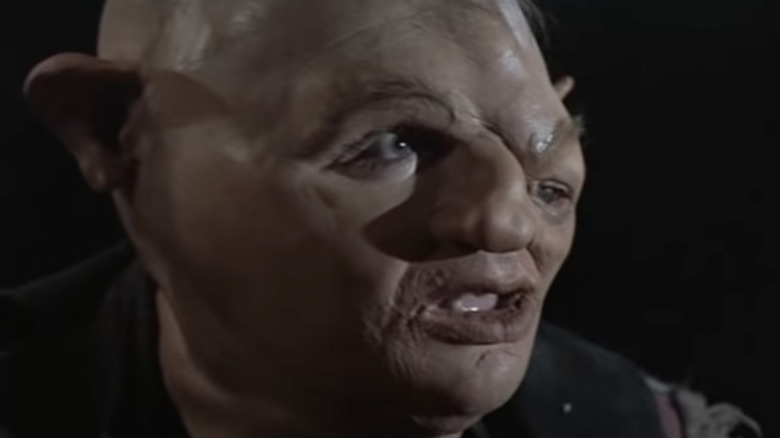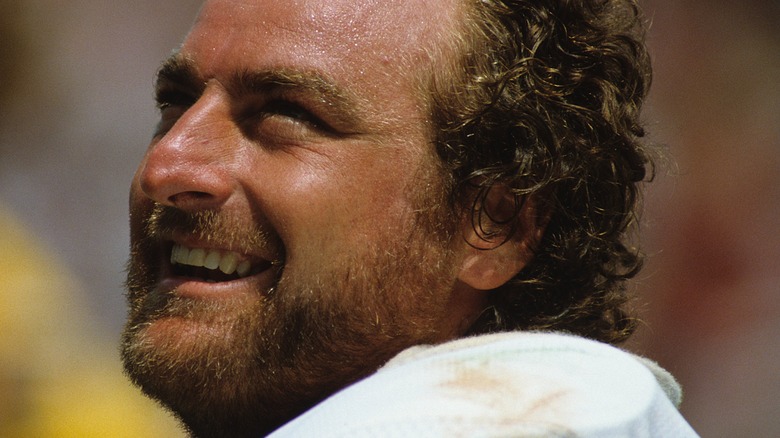The One Tragedy That Forever Changed The Actor Who Played Sloth In The Goonies
The following article contains mentions of substance abuse.
Acting wasn't John Matuszak's first job, but he ended up eternalized in the cult classic "The Goonies" as Sloth, the Fratelli child who suffered from malformations and was abused by his mean — and criminal — family. Before kicking off his acting career, Matuszak, also known as the Tooz, was a defensive end with not one but two Super Bowl trophies in his cabinet, per Sportscasting. Unsurprisingly, Matuszak's first major role saw him portray — you guessed it — a football player in the 1979 film "North Dallas Forty," which also starred Nick Nolte. Because Matuszak stood at 6 foot 8, he also landed parts in adventure and fantasy films portraying "gentle giants" and oddballs, according to Sportscasting.
Matuszak's life came to an untimely end on June 17, 1989, when he died from an accidental overdose of a prescription drug at the age of 38, The New York Times reported. The Los Angeles County Coroner's Office also noted finding non-lethal amounts of cocaine in his system at the time of his death.
Despite his unquestionable talents, Matuszak is perhaps best known for his lifestyle. In fact, per Bleacher Report, Matuszak was named once named on a list of the "Top 5 NFL Bad Boys."
Sadly, Matuszak's life was also marked by pain and tragedy. Read on to learn about his struggles.
John Matuszak struggled with chronic pain, which led him to drugs
Chronic pain is nothing new to athletes. According to a 2020 University of Florida study, 90% of former NFL players report living with pain after retiring. That was true for John Matuszak, who sustained his first serious injury still during his college years when he suffered a minor separation of his shoulder while playing for the University of Missouri. The main blown to his health happened in the early 1980s, when a series of back injuries and subsequent surgery put the Oakland Raiders star on the injured reserve list for the entire 1982 season, as United International Press noted. In 1983, his injuries forced him to retire, per the report.
At the time of his death, his parents, Marv and Audrey Matuszak, said in a statement that their son turned to prescription painkillers and other drugs to manage his daily discomfort, the Associated Press reported. "We are not unmindful of the problems our son had in his battle against chronic pain and his resulting use of drugs, both prescription and otherwise," the Matuszaks said.
In 1999, the Chicago Tribune claimed that Matuszak's back pain contributed to his early death, criticizing the football culture that pushes athletes to put their career above their health. "His back pain had not stopped when the games did... Football defined John Matuszak's life. Then, and now, you could make a very strong case that football was partly responsible for his death," the Tribune contended.
John Matuszak tried to get his addictions under control
John Matuszak led a life of excesses, regardless of his physical pain. According to his former girlfriend, Stephanie Cozart, Matuszak also turned to drugs to deal with family trauma. As the Chicago Tribune explained, both of Matuszak's brothers died young of cystic fibrosis. "The man was in a lot of emotional pain. He had a lot of childhood stuff to deal with," she told the LA Times in 1989. "He had a lot of present-day stuff. He was a therapist's dream," Cozart said.
After retiring from football and kicking off his acting career, Matuszak tried to regain control of his life. "He was trying really hard to keep things under control. He was in AA — Alcoholics Anonymous — and he was trying his damnedest to succeed," Cozart told the Orlando Sentinel. In his 1987 autobiography, "Cruisin' With the Tooz," Matuszak recounted his attempts to get help, according to The New York Times. "I abstain from cocaine, and any other foreign substance, entirely now. I take nothing, not even sleeping pills. I've hit damn near bottom. I don't ever want to go back," he wrote.
Cozart told the Orlando Sentinel that he had, in fact, left his wild days behind, though she admitted the damage may have been done. "It's no secret that at one time he had an excessive lifestyle, and it might have taken its toll physically," she said.
If you or anyone you know is struggling with addiction issues, help is available. Visit the Substance Abuse and Mental Health Services Administration website or contact SAMHSA's National Helpline at 1-800-662-HELP (4357).



